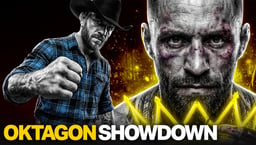
Issue 070
December 2010
Antonio Inoki inspired MMA and groomed ‘The Dragon’ for superstardom.
Mention the name Antonio Inoki – ‘Tokyo Tom’ – to almost any Japanese citizen, and they’ll smile with recognition. A titanic media figure in the orient, he’s also credited with pioneering modern mixed martial arts. Firstly by ‘fighting’ Muhammad Ali in a mixed-rules match in 1976, and concurrently with his proto-MMA promotion the Brazil-based Jungle Fight.
Inoki’s imposing frame, superhero’s chin, booming voice and intense stare make him difficult to forget, even today at the ripe age of 67. If Fighters Only readers don’t recognize the name, you may’ve seen a notorious 2003 clip of Lyoto ‘The Dragon’ Machida receiving several hard, but essentially ceremonial, slaps from the recognizable Inoki while exiting a Japanese ring. This is the ‘toukon’ slap, a sign of respect intended to ‘generate fighting spirit’. It is only to be administered by legends.
Antonio Inoki has been a sportsman, professional wrestler, mixed martial artist, politician, diplomat, television personality and fight promoter. Born in Yokohama, Japan in 1943, Inoki and his family emigrated to Brazil in 1957. Between 1931 and 1935, 72,661 Japanese had done the same, reaching a peak that had been trending for years. The relationship between the two countries was well established. There, Inoki’s natural athletic gifts afforded him success in track and field. He took the All-Brazil shot put and discus championships in 1959, catching the eye of one ‘Rikidozan’.
Rikidozan was a Korean-born Nipponese considered the father of pro wrestling in Japan. During the country’s post-war depression he recaptured a little pride by dispatching foreign wrestlers with karate chops and powerful slams. Like many other Japanese fighters at the time, he made regular visits to Brazil to meet challenges and scout talent. He recruited Inoki to join him back home and fight for the Japan Wrestling Association (JWA).
Rikidozan was murdered by gangsters in 1963 leaving a gaping hole in Japan’s wrestling world, one that Inoki would eventually fill. From 1964 to 1966 he wrestled mostly in America before returning to Japan and founding Tokyo Pro Wrestling. Apart from a brief return to JWA, Inoki’s next major step was to found New Japan Pro Wrestling (NJPW) in 1972. NJPW is still one of the largest and most popular wrestling organizations in the world thanks to its deal with public television station TV Asahi in Japan. During his tenure at NJPW, Inoki began to develop his ‘strong style’ of hard, realistic-looking matches using real combat techniques. He fought Karl Gotch, perhaps the most famous professional wrestler ever, and would inherit Gotch’s less flamboyant but more realistic wrestling style.
In the ‘70s, Inoki began laying the foundations for what would eventually become Japanese MMA, by engaging in real fights with representatives from other disciplines. The fights were sometimes hesitant affairs with fighters unsure of rules, and when punches came they were often met with cries of surprise from outraged cornermen. Inoki fought Olympic judo gold medalist Willem Ruska from the Netherlands and knocked him out by suplexing him. Against Punjabi wrestling legend Akram Pahalwan, Inoki showed his ‘strong style’ by taking him down, pounding and then actually breaking the arm of the outmatched Pakistani. He fought against Muhammad Ali in the hot Japanese summer of 1976, in a bizarre bout in which the rules hamstrung Inoki into only being allowed to kick while grounded. Over 15 rounds, culminating in a draw, Inoki pummeled Ali’s legs with kicks from his back. Some say the boxing legend never recovered; his footwork was never the same again.
In 1995, Inoki took NJPW to the city of Pyongyang, in the famously secretive dictatorship of North Korea, on a mission of peace. A match between Inoki and American wrestling legend Ric Flair headlined a two-day ‘Peace Festival’ at the dictatorship’s May Day Stadium that drew an incredible 340,000 fans. In 1989, he promoted the first ever pro wrestling card in Moscow. And, elected into Japan’s upper political echelons (the House of Councilors) in 1989, Inoki would travel the world and acted like an alpha male of mercy, engaging in talks with Saddam Hussein and Fidel Castro.
Inoki initiated a carefully orchestrated retirement from wrestling after a career spanning four decades, finally hanging up the boots in 1998. He still remains a hugely important figure on today’s international MMA scene.
Along with his close friend and protégé, Wallid Ismail, Inoki created the aforementioned Jungle Fight, an influential promotion in the development of the country’s MMA talent. At home in Japan, Inoki hosted international stars such as Fedor Emelianenko, Alistair Overeem, Josh Barnett and Lyoto Machida at his Inoki Bom Ba Ye New Year’s Eve MMA events. Machida is said to have been of particular interest to Inoki, who became involved with the UFC light heavyweight superstar’s early training and management.
Inoki inspired legendary Japanese fighters such as Satoru Sayama (the founder of the Japanese Shooto organization), Masakatsu Funaki (who fought BJJ legend Rickson Gracie), Kazuyuki Fujita (who almost knocked out former Pride heavyweight champion Fedor Emelianenko) and Josh Barnett to represent professional wrestling in ‘real fights’. His fighting spirit, or ‘moeru toukon’, still burns long after retirement.
CAREER SNAPSHOT
1972
Founds New Japan Pro Wrestling, which becomes one of the biggest wrestling promotions in the world.
1975
Wrestles Billy Robinson, English catch-wrestling legend and influential trainer of Josh Barnett and Kazushi Sakuraba.
1982
Tag teams with Hulk Hogan at the then-annual Madison Square Garden Tag League event.
1998
Retires from professional wrestling.
2010
Becomes the first foreign wrestler to be inducted into the WWF Hall of Fame.
...









